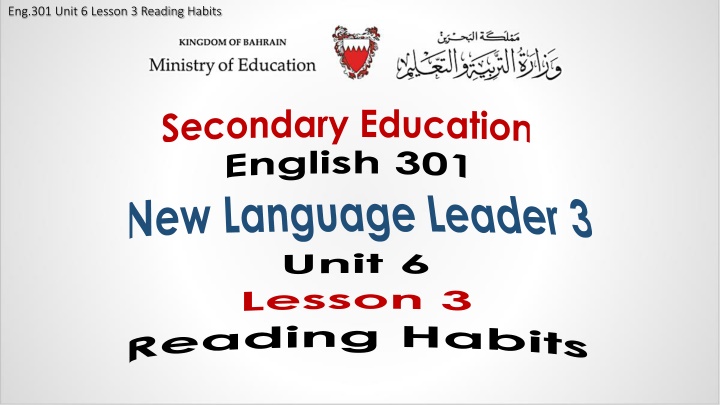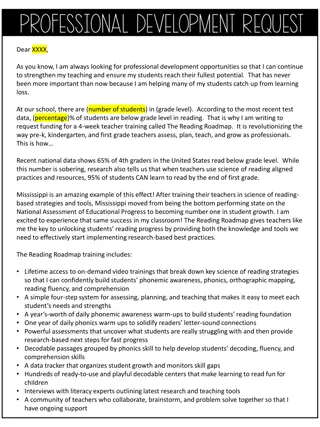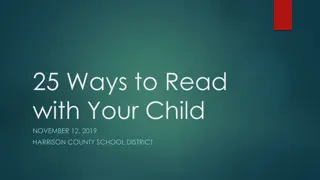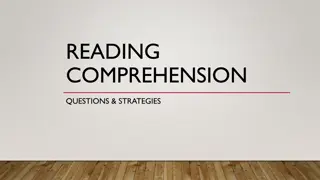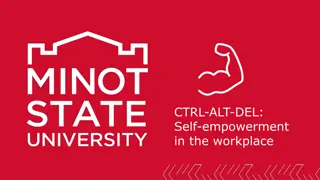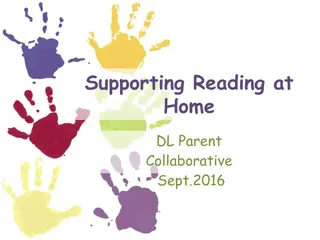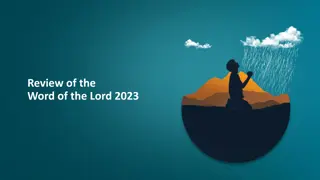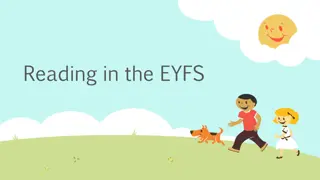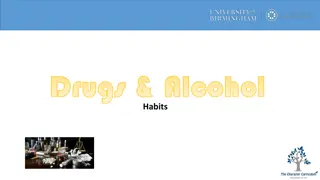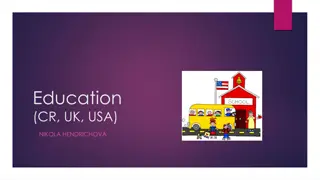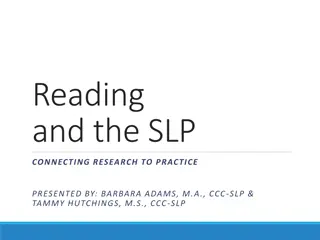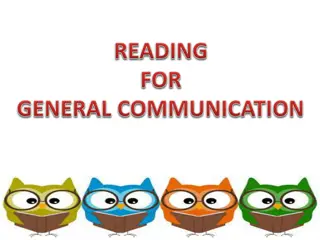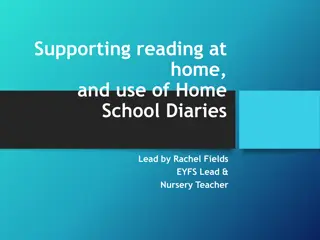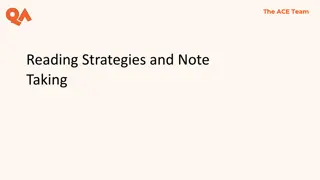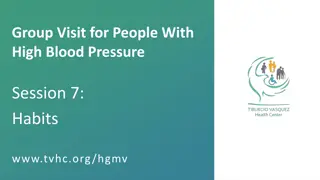Developing Good Reading Habits in Secondary Education
Explore the importance of developing good reading habits in secondary education, focusing on extracting specific information from texts and using language items effectively. Understand the difference between good and poor reading habits, learn how to set reading goals, assess progress, and enhance reading experiences. Dive into a discussion on children's lifestyle changes during the Coronavirus lockdown and discover strategies to minimize potential risks. Engage in activities to improve reading comprehension and vocabulary skills.
Download Presentation

Please find below an Image/Link to download the presentation.
The content on the website is provided AS IS for your information and personal use only. It may not be sold, licensed, or shared on other websites without obtaining consent from the author.If you encounter any issues during the download, it is possible that the publisher has removed the file from their server.
You are allowed to download the files provided on this website for personal or commercial use, subject to the condition that they are used lawfully. All files are the property of their respective owners.
The content on the website is provided AS IS for your information and personal use only. It may not be sold, licensed, or shared on other websites without obtaining consent from the author.
E N D
Presentation Transcript
Eng.301 Unit 6 Lesson 3 Reading Habits Secondary Education English 301 New Language Leader 3 Unit 6 Lesson 3 Reading Habits
Eng.301 Unit 6 Lesson 3 Reading Habits OBJECTIVES By the end of the lesson, you will be able to: extract specific information and language items from a reading text. use used to , would and get used to in context.
Eng.301 Unit 6 Lesson 3 Reading Habits Eng.301 Unit 6 Lesson 3 Reading Habits
Eng.301 Unit 6 Lesson 3 Reading Habits Good and Poor Reading Habits Decide whether the following reading habits in the table below are good or Poor. Habit Good/Bad good I rarely buy a ton of books at the same time. poor I judge books by their covers. I can set a reading goal. Periodically, I assess my goal, set a new goal, and keep a record of my progress. good poor I love reading in poor light. good poor I don t like to leave books unread. I rarely use a dictionary when I encounter incomprehensible words. good poor poor I know the kind of books I ll love. I forget to take notes while reading and don t know how to write my reviews afterwards. I like reading more than one book at a time. good I always use a bookmark. Eng.301 Unit 6 Lesson 3 Reading Habits
Eng.301 Unit 6 Lesson 3 Reading Habits Reading Write down the following questions before moving to the reading text on the following slide. 1) How has the children s lifestyle changed during the Coronavirus lockdown? _________________________________________________________________________________________ 2) What does the writer suggest to minimize the potential risks facing our kids? _________________________________________________________________________________________ 3) Keeping youngsters occupied ( paragraph 2) The word occupied probably means a. inhabited b. unavailable c. busy 6) The word haven (paragraph 2) probably means a. port c. refuge d. application (to attribute human nature or character to an object). 5) Find a word that the writer uses to personify the book. ___________________________________ 6) The pronoun that ( paragraph 3) refers to ____________________________ Eng.301 Unit 6 Lesson 3 Reading Habits
Eng.301 Unit 6 Lesson 3 Reading Habits Now read the article below and answer the questions that you covered on the previous slide. 1 your reading habits revolve around Facebook, Twitter, or the list of ingredients for your instant soup? If you are one of the many people who are not used to reading every day, you are missing out on many benefits. 2 With confinement to counter the Coronavirus, many aspects of the lives of children and adolescents now happen online. Their contacts with their friends and families, their hobbies and even their school learning can take place in front of a screen. Keeping youngsters occupied also allows parents to have time for themselves or for work. However, increasing the time spent in front of a screen can put children at greater risk. Confronting content that is inappropriate for their age, exploitation of private data, cyberbullying or blackmail online, or even child trapping and Internet exploitation are all issues that should not be overlooked. By this, the book acts as a safe haven. A great way to get away from it all, reading is also "a friendship , a way to feel less alone thanks to a friend who wishes you well. 3 I think reading can really help us get through these strange weeks. Reading a good book helps us with speaking and writing and much more. I check it every day. It speaks to us about us and the world, moves us although we remain motionless. It allows us to change our point of view, borrowing that of one or another, even if we always see the same thing through our windows. No matter how much stress you have, it all just slips away when you lose yourself in a great story. A well-written novel can transport you to other realms, while an engaging article will distract you and keeps you in the present moment, letting tensions drain away and allowing you to relax. 4 So, I hope that more people will be interested in this activity which, in my opinion, is liberating. It simply allows us to think without any limits about what is happening around us. When was the last time you took the time to read a book, or a long article in your favorite magazine? Do Eng.301 Unit 6 Lesson 3 Reading Habits
Eng.301 Unit 6 Lesson 3 Reading Habits Reading Check your answers 1) How has the children s lifestyle changed during the Coronavirus lockdown? Many aspects of their lives happen online. They are connected online more than ever. 2) What does the writer suggest to minimize the potential risks facing our kids? Encouraging kids to read books; it can really help minimize the many risks that kids can face online. 3) Keeping youngsters occupied ( paragraph 2) The word occupied probably means a. inhabited b. unavailable c. busy 6) The word haven(paragraph 2) probably means a. port c. refuge d. application 5) Find a word that the writer uses to personify the book (to attribute human nature or character to an object). The book is compared to a friend. 6) The pronoun that ( paragraph 3) refers to point of view Eng.301 Unit 6 Lesson 3 Reading Habits
Eng.301 Unit 6 Lesson 3 Reading Habits Grammar Used to, Would, Get Used to Get Used to Used to Would Get used to + a gerund (-ing verb) or a noun indicates that something is becoming familiar. Use this expression for a new habit or routine. Use used to + infinitive without to, Used to can be used to talk about past states as well as past repeated actions and habits. would+ infinitive without to , is only used for repeated actions habits. Would is NOT used to talk about past states. Examples: When he was at school, he would play football every Saturday". used to' and 'would' are both good here, and the meaning is the same. " When he was at school, he used to play football every Saturday." Here, we're talking about 'playing football every Saturday'. This is an action that was repeated many times, so we can also say: 'Used to' and 'would' are both good here, and the meaning is the same. Examples: We used to live in Manama. state/condition I used to read a lot when I was young. (past repeated action/habit) Though it is possible to use get used to for both positive and negative experiences, it is more commonly used with negative situations something is difficult). (e.g., when Mind the spelling for statements, questions and negatives. Examples: I am getting used to living with my new roommate. They couldn t get used to the noisy neighborhood, so they moved. Examples: Did you use to read many books when you were young? Yes, I used to read a lot. No, I didn t use to read much. Eng.301 Unit 6 Lesson 3 Reading Habits
Eng.301 Unit 6 Lesson 3 Reading Habits Let s have some practice Choose the correct option. Sometimes both options are correct. 1. My grandma used to / would love gardening. 2. A few years ago, my brother didn t use to / wouldn t help me with my homework now he does! 3. On rainy days, I used to / would read books and comics. 4. Did you used to/ Did you use to get into trouble with your classmates when you were at school? 5. When I had to commute to work every day, I used to get up/ used to getting up very early. 6. My dad used to / would pay a lot for good beef in the supermarket, but now he s vegetarian! 7. I didn t use to / wouldn t like football then, but I like it now. 8. When I was little, my mum used to / would read me a story every night. 9. I used to / would live in Edinburgh when I was young. 10. I'm afraid I'll never get used to living / used to live in this place. I simply don't like it and never will. Eng.301 Unit 6 Lesson 3 Reading Habits
Eng.301 Unit 6 Lesson 3 Reading Habits Put the verbs between brackets in the correct tense and form. Use Would and used to where appropriate. When I was 14, we ______________ (move) to London and my life ______________ (change) forever. Before that, we ______________ (live) in a small house with a big garden at the edge of the village. The village was busier than it is today. There ______________ (be) two shops, a post office, a school and a coffee shop. They ve all gone now. I remember we ______________ (not / have) much money. One day I ______________ (lose) $20 and my mum was very angry. To cut costs, we ______________ (grow) a lot of our own food in the garden. We kept chickens too, and every morning I ______________ (have to / go) out to the henhouse and collect the eggs for breakfast. I ______________ (hate) this chore, especially in the cold weather. There was a wood near the house it s still there - and in the winter I ______________ (go) there with my dad and sister to look for firewood. We ______________ (bring) this home and my dad ______________ (chop) it up and put it in the open fire that we ______________(have) in the sitting room. About a mile from the house, there ______________(be) a railway line. That s gone now too. We ______________ (often / go) there at the weekend to watch the trains. But we ______________ (get) into trouble if my mum found out. We ______________ (send) to bed early and not allowed out the next day. We ______________(not / have) a TV we couldn t afford one. So in the evenings we ______________ (read) or play games together and before we went to bed, my dad ______________ (tell) us stories about when he was young. Eng.301 Unit 6 Lesson 3 Reading Habits
Eng.301 Unit 6 Lesson 3 Reading Habits Now check your answers When I was 14, we (move) to London and my life (change) forever. Before that, we (live) in a small house with a big garden at the edge of the village. The village was busier than it is today. There (be) two shops, a post office, a school and a coffee shop. They ve all gone now. I remember we (not / have) much money. One day I (lose) $20 and my mum was very angry. To cut costs, we (grow) a lot of our own food in the garden. We kept chickens too, and every morning I (have to / go) out to the henhouse and collect the eggs for breakfast. I (hate) this chore, especially in the cold weather. There was a wood near the house it s still there - and in the winter I (go) there with my dad and sister to look for firewood. We (bring) this home and my dad (chop) it up and put it in the open fire that we (have) in the sitting room. About a mile from the house, there (be) a railway line. That s gone now, too. We (often / go) there at the weekend to watch the trains. But we (get) into trouble if my mum found out. We (send) to bed early and not allowed out the next day. We (not / have) a TV we couldn t afford one. So in the evenings we (read) or play games together and before we went to bed, my dad (tell) us stories about when he was young. used to tell changed moved used to live used to be didn't use to have used to grow would have to go lost used to hate would go would chop would bring used to have used to be would often go used to get usedtobesent didn't use to have would read Eng.301 Unit 6 Lesson 3 Reading Habits
Eng.301 Unit 6 Lesson 3 Reading Habits THIS IS THE END OF THE LESSON. THANK YOU FOR YOUR ATTENTION AND HARD WORK. Eng.301 Unit 6 Lesson 3 Reading Habits
